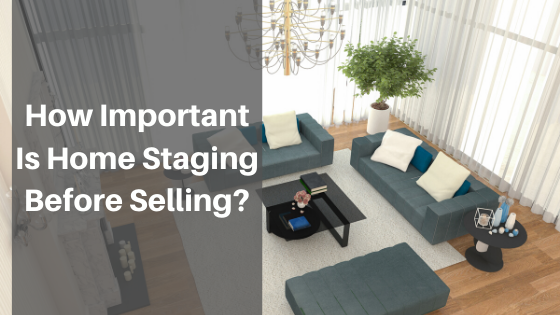In most real estate markets in Canada, home staging is a big part of the selling process, and doing it well can put your property ahead of the rest.
Staging your house may just be what you need to sell this summer! The objective of home staging is to sell faster and at a better price.
Did you know that 36% of potential buyers are willing to pay more for a home that is well decorated and maintained?
But what is home staging exactly?
It’s a precise and specialized approach that aims to enhance the appearance of properties for sale on the market. Home staging techniques serve the purpose of depersonalising the rooms of your property so potential buyers can easily visualize themselves living there with their own belongings and furniture. Therefore, its main objective is opposed to interior decorating.
Home staging could also be considered a technique that brings interior decorating and marketing together. It’s in this spirit that we recommend that you stage your home at the very beginning of the selling process. This way, the marketing will be perfect from the very beginning, starting with the pictures of your home displayed on your agent’s Website.
Preparing your Home for Sale :
With so much to gain, it makes sense for sellers to put time and effort into staging their home, and fortunately, many of the best staging tips don’t require spending a lot of money. Whether you’re just getting ready to sell or are trying to add new life to a stagnant listing, take a look at these home staging tips and make changes that can help your home sell faster and for more money.
Depersonalisation:
This first step can be done for free. It consists of removing most personal effects off the walls, surfaces and furniture. It is recommended to remove toothbrushes, used soap bars, family pictures, towels and pet bowls away from sight. Exposed artwork and decorative objects should be sparingly displayed. Remember it is your home that is being sold. Therefore, it’s important to highlight your walls and not what is on them.
Decluttering:
During the home staging process, It is preferable to remove most objects from walls, tables, desks and counters. You should also decrease the number of books and trinkets from your shelves and you should hide away your children’s toys. Superfluous objects are a visual source of distraction during visits. They take your potential buyer’s focus away from your home and onto your personal belongings. The period during which you are staging your home is possibly the best time to actually start packing away the objects you don’t frequently use. This way, you will be ready much faster when it will finally be time to move.
Wallpaper and Paint
It is unlikely that a potential buyer will like your wallpaper. Your best bet is to tear it down and paint the walls instead. It’s best not to paint over the wallpaper because it may look shabby and send a signal to the buyer about potential work they may have to do later.
Potential buyers will likely feel the same way about custom paint colors. You may love your orange bathroom, but people’s tastes in colors are very specific and highly personal. While you might think that white walls would be ideal because they create a blank slate that allows buyers to envision their own décor and gives them an easy starting point, it’s actually better to paint your home with warm, neutral colors.
Defining rooms:
Make sure that each room has a single, defined purpose. And make sure that every space within each room has a purpose. This will help buyers see how to maximize the home’s square footage. If you have a finished attic, make it into an office. A finished basement can become an entertainment room, and a junk room can be transformed into a guest bedroom. Even if the buyer doesn’t want to use the room for the same purpose, the important thing is for them to see that every inch of the home is usable space. This includes alcoves, window seats, corners, breakfast nooks, etc.
Lighting
Take advantage of your home’s natural light. Open all curtains and blinds when showing your home. Add supplemental lighting where necessary. Outdated or broken light fixtures can be cheaply and easily replaced. If you think your existing fixtures are fine, make sure to dust them and clean off any grime.
Exterior
Perfect exterior home staging is just as important as creating the perfect atmosphere inside of your home. Curbside appeal is one of the most crucial criteria to consider when placing your house for sale, since it can really help to create a positive first impression on a prospective buyer. However, all the outdoor spaces on your property are valuable in winning over interested parties who come to view your home.
When asked about the importance of exterior spaces, most buyers rank the great outdoors as being almost equal to interior space when deciding on which home is right for them. Not staging your yard, pool, patio, deck or terrace is a real shame, since these features often stand out in the minds of potential buyers and can truly make or break a lucrative deal.
How Much Does it Cost To Have Your Home Staged?
Staging is all about making your home inviting to a large number of potential buyers. To do this, a property owner must be willing to spend a little extra time and money to make their home as desirable as possible.
According to Studies home sellers spend an average of $1,800 to stage a home, but costs can range from a couple of hundred dollars to $5,000 or more.
The main contributing factor in this being whether or not you have personally staged your home or hired a professional to do so.
Depending on the work that must be done to effectively stage and sell your home, prices may vary; however, most of the time your investment is well worth it in the end.
Before and After Photos 
With an ever-changing housing market, plans are often subject to change. However, one way to make your next move your most profitable is to look into staging your home for potential buyers. Not only will this help you to stand apart from others on the block, but it will allow the process of buying and selling a home to progress seamlessly. So yes, you should stage your home.





